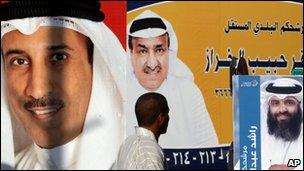Q&A: Bahrain elections
- Published

The election comes after months of Shia unrest in the Sunni-ruled kingdom
Bahrain, a small island kingdom off the east coast of Saudi Arabia, is going to the polls on 23 October to elect its parliament. Bahrain is unusual among Gulf states in having an elected parliament, and this will be the third poll since 2002.
Bahrain is also unusual in having a Shia Muslim majority, like Iran and Iraq, although its ruling family, al-Khalifa, adheres to Sunni Islam like most Gulf Arabs. Shia Bahrainis complain about discrimination in the allocation of public sector jobs and manipulating electoral boundaries to ensure disproportionate representation for Sunnis.
Who is voting in the election?
Bahrain has a population of about 1 million, of whom about half are expatriate workers with no voting rights. Of the native Bahrainis, men and women over the age of 20 can vote - about 300,000 people.
Shias boycotted the 2002 election, but voted in 2006 - resulting in a clear win for the Shia opposition al-Wifaq movement. This time the second largest and more radical Shia movement, Amal, has called on its supporters to boycott the vote, complaining that the parliament is a sham, but al-Wifaq is putting up candidates.
How is parliament elected?
The lower house - the Council of Deputies - has 40 MPs, who are directly elected. Winning candidates must have a majority of votes in the given constituency, so run-off elections are not uncommon.
The upper Shura Council also has 40 members, and is entirely appointed by the royal family. It can and does over-rule the lower house, and is a major source of complaints by democracy campaigners and Shia politicians.
In addition, the king appoints all ministers without parliamentary scrutiny.
Lower house candidates must be literate Bahraini nationals, aged at least 30, with no criminal convictions.
Are there women MPs?
One. Latifah al-Qoud was elected unopposed in 2006, and is standing unopposed again this time.
Eight other women are also standing, down from 17 in 2006. Women's rights campaigner and former parliamentary candidate Shahzalan Khamis told the press that she did not expect a "breakthrough" for women in 2010, as constituencies remain the same.
Which major parties are standing?
The constitution bans political parties, which therefore stand as "societies".
The Shia al-Wifaq is putting up 18 candidates in four of the five provinces. It has 17 MPs in the outgoing parliament. However, one independent MP co-operated with the group, bringing the number effectively up to 18.
Al-Wifaq is campaigning against "tribal and sectarian favouritism" in favour of a genuine multi-party democracy, and for parliament to vet the king's ministerial appointments. It is an Islamist party, but focuses more on seeking equality for Shias.
The two other major parties standing are the Sunni al-Asalah and al-Minbar societies.
Al-Asalah promotes the Salafi brand of hardline Islam and so opposes most of Bahrain's modernisation, such as women MPs. It is standing on a platform of combining royal rule with Islamic Sharia law. It had six MPs in the outgoing parliament.
Al-Minbar is associated with the Muslim Brotherhood conservative movement, and also campaigns for a monarchy under Sharia law. Unlike Al-Asalah, it has no objection to women MPs. It had seven MPs in the outgoing parliament.
Al-Asalah and Al-Minbar usually avoid putting up candidates against one another, in order to maximise Sunni Islamist representation.
The remaining members of the 2006 parliament were one opposition leftist from the Waad society and nine pro-government non-affiliated MPs. Secular parties are not expected to perform well this time either.
How free and fair will the elections be?
They are taking place against a background of violent Shia protests about what they call their "second-class" status. The authorities responded with greater vigour than usual by arresting 23 activists and allegedly torturing some. The activists are to stand trial on charges of plotting a coup with foreign (usually meaning Iranian) support. The trail opens five days after the election.
The government says that the vote will be a "celebration of democracy", in the words of the head of the Electoral Commission, Justice Minister Sheikh Khalid al-Khalifa. There will be no foreign monitors, just as in previous polls, although foreign reporters will be covering the election.
The government says 292 local observers will monitor the vote, but has ousted the board of the independent Bahrain Human Rights Society ahead of the poll. The society's website has warned against imposters posing as Bahrain Human Rights Society monitors.
The authorities have also suspended four opposition election newsletters, including that of al-Wifaq, saying that they are in breach of electoral regulations.
This is in addition to the opposition's regular complaints that constituency boundaries are drawn to disenfranchise Shia voters, Sunni Arab foreigners have been granted voting rights, and the Shura Council is packed with government appointees. Most leftwing groups and radical Islamists are continuing their longstanding poll boycott.
What is the likely result?
Analysts say that a fair vote would see al-Wifaq returned with most seats, as in 2006, given that it is the only Shia party standing. A win for Sunni parties would cast serious doubts on the fairness of the vote, and a further round of Shia protests would be bound to follow, they add.
- Published8 September 2010
- Published5 September 2010